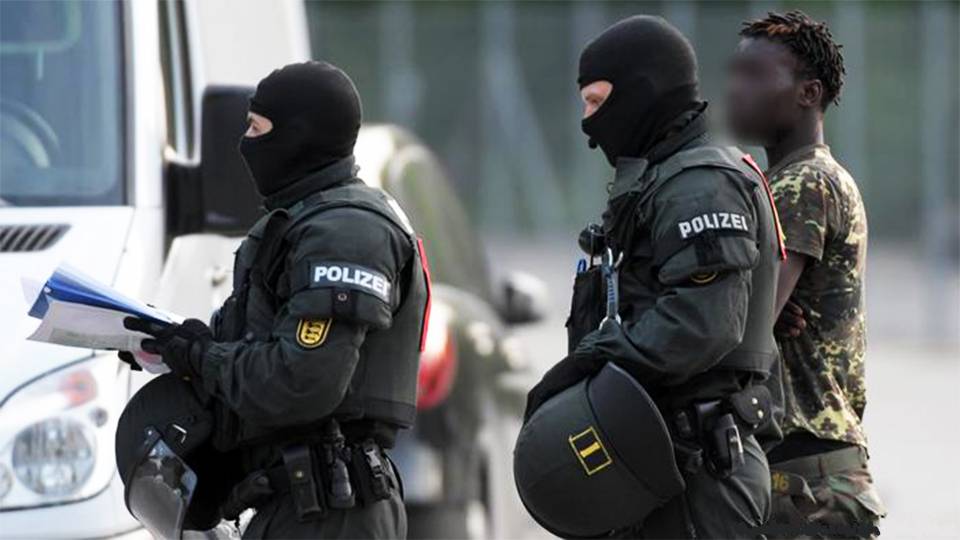Migrants 'Issue Ultimatum & Forcefully Prevent' German Police from Deporting Failed Asylum Seeker
German police have been forced to release a failed asylum seeker they were due to deport after being confronted by an angry mob of migrants. The officers caved in to the crowd's demands and fled to avoid a "dangerous escalation."
The incident took place in the town of Ellwangen in southern Germany overnight into Monday when a group of police officers arrived at a local refugee reception center. They were due to find and deport a Togolese man, 23, the Aalen police department said in a statement on Wednesday.
The officers had already detained the man and put him into a police car, when a crowd of about 50 people, who were living in the reception center, demanded the Togolese national be released "in an aggressive and threatening manner."
Following what the statement described as an "extremely aggressive” confrontation that could allegedly “spiral into violence at any moment," police had to release the man, who was already in police custody, in order to "avoid drastic escalation of the situation that could occur otherwise." The police also said that, at some point, the mob grew from 50 to some 150 people.
The refugees and migrants allegedly encircled the two police cars that were present at the scene and started harassing the officers, the German dpa news agency reported. "They were very aggressive and threatened us in such an increasingly explicit manner that we had to leave the man [in the car] … and retreat to the reception center ward," a police officer, who took part in the operation, told the news agency.
Police only confirmed in its statement that a police car was damaged as a result of the confrontation. The dpa further reported that the migrants then sent a center security guard as a messenger to the police officers, who had barricaded themselves in the ward. "Their message was an ultimatum: either the police officers remove the handcuffs from the Togolese within two minutes or they [the migrants] storm the gates [of the ward]," the DPA reported.
The officers then handed over the key to the handcuffs to the security guard, who supposedly gave it to the migrants. The Togolese man, who was due to be deported, disappeared following the incident, the German media report.
The deputy head of the Aalen police department, Bernhard Weber, praised the actions of the officers "under such exceptional" circumstances. "I can only show great respect for my colleagues," who were able to "keep a cool head" in such a situation, he said in a statement, apparently implying that, even though a massive breach of public order would justify the use of force by the police, it was not really necessary.
At the same time, he seemed to seek to downplay the incident. "We believe that those who confronted [the police], were also in an extremely tense situation," Weber said, adding that the migrants apparently "got carried away" by some sort of a corporate feeling and took the actions "they would have probably never taken following a thorough consideration."
The police chief admitted, though, that "it is clear that a state governed by the rule of law should not let itself be barred from enforcing this rule of law by an aggressive mob." The police emphasized that it has launched a probe into the incident over the unlawful release of a detainee and a breach of public order.
The incident, however, provoked concerns among local politicians. "Attacks on police officers are unacceptable," Uli Sckerl, a member of the regional parliament from the Green Party, told journalists. He also said that such behavior should be followed by legal consequences."Frustration does not justify crimes," he added.
The faction leader of the right-wing populist Alternative for Germany party in the regional parliament, Bernd Goedel, condemned the incident by calling it the "state's failure." "If the authorities show that they can yield to pressure even once, then one will see the same situations in the future," he warned. The leader of the regional parliament's faction of the Free Democrats, Hans-Ulrich Ruelke, also described the incident as an "alarming situation."
More than a million migrants from predominantly Muslim countries have entered Germany since the refugee crisis erupted in 2015 – fueling strong anti-migrant sentiments and protests against Merkel's open-door policy. Germany also faced a number of terrorist attacks involving refugees as well as sexual harassment incidents like the notorious ones during the 2015 New Year's Eve celebrations in Cologne and other cities.
Facing increased public pressure, Merkel eventually partially changed her stance on immigration. Even though she never admitted that her open-door policy was wrong, her Christian Democratic Union and its Bavarian allies, the Christian Social Union agreed to cap the number of asylum seekers at 200,000 a year. However, recently Merkel also announced that Germany will take in some 10,000 new migrants, who were selected by the UN's refugee agency.






















